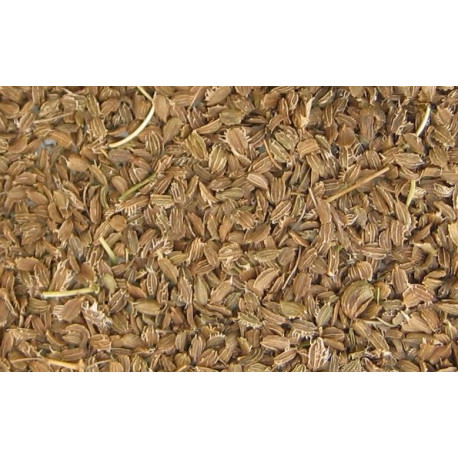- In the process of being restocked




Reference: 169202
Carrot seeds are very rich in vitamins with a high proportion of vitamin A and carotene, as well as vitamin B, calcium and valuable carbohydrates.
Carrot seeds are very rich in vitamins with a high proportion of vitamin A and carotene, as well as vitamin B, calcium and valuable carbohydrates.
Flaxseed is composed of 40 to 45% oil and 25% protein. Flaxseed keeps very well. In particular, it contains two fatty acids with similar names (and whose root is the word "flax"), linolenic acid (an omega 3) and linoleic acid.
The seed is used in animal feed, especially for laying hens whose omega 3 content is to be increased.
Through these properties, this seed promotes digestion.
The sunflower seed contains nearly 40% lipids, but also proteins, carbohydrates, and vitamins B and E. A sunflower seed contains approximately 600 kilocalories per 100 g.
It meets the needs of a wide variety of birds throughout the year, including the smallest among them.
Sunflower seeds are a real treat for our birds who love them!
Millet is used in the diet of all birds: straight beaks and hooked beaks. In bunches, it's a treat they love.
Cluster millet has a good protein and carbohydrate content and also contains a large number of amino acids. Ideal for distracting your birds and thus avoiding pecking (feather pulling).
Carrot seeds are very rich in vitamins with a high proportion of vitamin A and carotene, as well as vitamin B, calcium and valuable carbohydrates.
Foniopaddy Seed is a natural grass seed grown on our plantations in Uganda. Scientific research has shown that Foniopaddy has a beneficial effect on coccidiosis.
Oatmeal or peeled oats are used in the composition of the basic mixtures of canaries and hooked beaks especially during the breeding and feeding period.
Its protein level is quite low, but it is a seed rich in energy.
Crude protein: 13%
Fat: 8%
Carbohydrates: 68%
Phosphorus: 0.4%
Calcium: 0.09%
Paddy Rice 20kg - Versele-Laga
Paddy rice seed or raw rice that is very suitable for exotic birds with strong beaks such as padda and birds of Asian origin. This seed is also appreciated by parakeets, parrots and exotic doves.
Soya beans are an excellent source of iron, zinc, manganese, copper, selenium, potassium, vitamins, fibres, polyunsaturated fatty acids, and antioxidants; in short, they are an excellent dietary supplement.
Soya beans are often used in sprouting seed mixes.
Paddy rice seed or raw rice which is perfect for exotic big-beaked birds such as padda and birds of Asian descent. This seed is also appreciated by parakeets, parrots and exotic doves.
Flaxseed is rich in omega 3, which is essential for the cardiovascular system.
Peeled oats 20kg
Prebiotic fibres are important for promoting a beneficial intestinal environment, maintaining good intestinal function, and minimising inflammation. Whole oats are a good source of protective compounds called polyphenols, which have antioxidant properties.
Pine seeds are a good source of Phosphorus, Magnesium, Zinc, Manganese, Copper, Iron, Vitamin E, K, B1, B2, B3, B9.
Turnip is almost similar to rapeseed, the difference is the more bitter flavor of the latter. Turnip seed is rich in protein and favourable to the improvement of song, so it is interesting during the breeding season in canaries.
A type of seed with a mild taste and high protein content. They are also high in fat.
This seed is quite fatty, we advise you not to exceed 10% of your shuttle mix for colored canaries or posture canaries.
For singing canaries, the shuttle softens the song and can therefore be used at 30% of the mixture: in the latter case, we advise you to accompany your bird's diet with liver support.
A 100% natural product that is mixed with breeding or with food; It doubles in size by adding water.
Carrots are very rich in vitamins with a high proportion of vitamin A and carotene, as well as vitamin B, calcium and valuable carbohydrates.
Striated sunflower is the basic seed of any parrot mixture. It is also used in mixtures for parakeets and exotic doves.
It is also the favorite food of your outdoor birds during the winter period! Ideal for feeding the birds in your garden.
Practical information for giving sunflower seeds to birds in your garden:
Remember to regularly clean the feeders of your outdoor birds so that diseases and bacteria do not thrive.
Also consider setting feeders high up to prevent predators (such as cats, foxes, etc.) from targeting birds when they are eating.

Carrot seeds are very rich in vitamins with a high proportion of vitamin A and carotene, as well as vitamin B, calcium and valuable carbohydrates.
